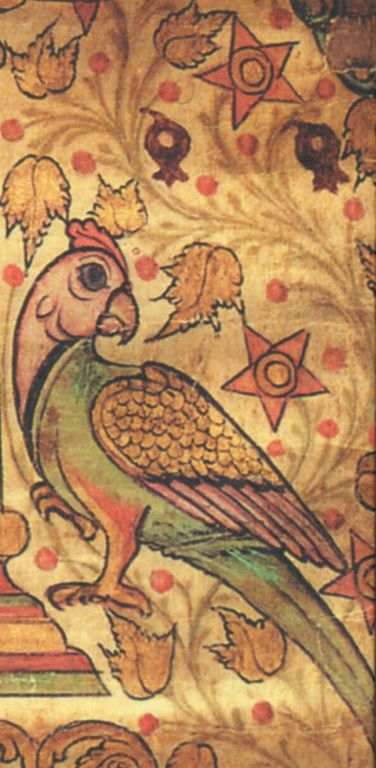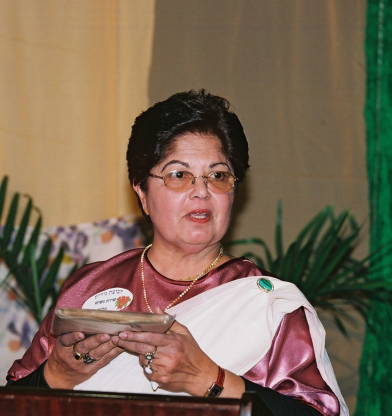1977
24. Blessing for the Bridegroom
Sarah Cohen, Ruby S. Hallegua. Recorded by Barbara Johnson, Kochi, January 2, 1977; II-9.
Taṃbirān muyiṃbu tŏņayāyirikkěņaṃ
Abṟaṃ ābīnūḍaruḷappāḍuņḍāyi
Valiya gŏlamākki ninně ñān věppeně
Vāsti vaḷaṟtti ñān ninḍě pěrimayuṃ
1. O Lord Tambiran, be our foremost help.
To Abraham Abinu, a promise You proclaimed:
“A very great People from you I shall create.
I shall bless you and make your name great.
Whoever blesses you, those also I shall bless.”
Like dew from heaven, may the Lord Tambiran
Give food and drink from the fat of the land,
Food and drink from the fat of the land,
Śadhāyi sātakan ninněyŏ vāstumě
Gulaṅṅaḷḍa kūṭṭattil pěruttavan nī ākuṃ
Abṟāminḍa vāḻvu ninakku tarunnavan
Kuḍiyirippu rājyaṃ ninakkŏḍaměyākuṃ
2. From Sinai Mountain, the Torah was given.
On a diamond tablet, the Torah was received.
It was shown to all who were living there,
But the noble People took it in their hands.
With dancing and singing, they took the Torah,
With joy in their hearts, and also with pride.
A treasure you will gain by the Torah of Moshe.
O God, You are the Sovereign, O foremost God!3. In the precious paḷḷi it arrived without delay.
The treasured Sefer Torah, with ornaments adorned.
Fifty-four sections were given unto us.
In the ark with four legs, the Torah was installed.
Blessings, always blessings—may the paḷḷi be blessed.
Tamburan Who rules on high! May the One be blessed!
This blessing song was performed on the wedding day by women gathered in the bridegroom’s house. They sang it immediately after the all-purpose Blessing Song (song 17) as the groom was moving about, kissing the hands of the elders before leaving for the synagogue to be married (Daniel and Johnson 1995, 184).
The blessings showered here on the bridegroom begin in the first two stanzas with God’s blessing of Abraham (Genesis 12:2) and Joseph, and stanza 3 includes specific blessings from Psalms 121: 3–4 and 91:10–11. The fourth stanza invokes all the blessings found in the twenty-four books of the Torah, and the fifth echoes Aaron’s blessing of Israel. This is the only song yet translated in which God’s presence in the Shekhinah is invoked as a personal blessing. As in the general “Blessing Song,” which is first sung to the bridegroom, this song concludes with the “wandering” stanza that recounts the blessing of Seraḥ bat Asher.
In their 1977 recording of this song, the two Paradesi-Kochi women skipped two stanzas, and moved directly from stanza 3 to the final stanza 6. They changed the melody for each stanza to make use of four popular Kerala Jewish melodies associated with joyous celebration.[1] The chant-like tune for stanza 1 has been identified as the melody used in Kerala for three different piyyutim: for ’Eḥad Yaḥid sung after prayers on the eighth night of Passover (’Areshet 1980, 42), for Yigdal ’Elohim Ḥai (Sefer Tefilat haḤodesh 1931, 17) sung on the last night of Simḥat Torah and for the bakashah titled Shuvi Nafshi (Sefer Tefilat haḤodesh 1931, 27).
Stanza 2 is sung to the tune of the morning bakashah Shaḥar ’Avakeshkha (Sefer Tefilat haḤodesh 1931, 24). The melody for stanzas 3 to 5 is that of Kumu beRinah (’Areshet 1980, 178), a piyyut for Simḥat Torah that is, perhaps, unique to Kerala. This piyyut is so popular with Kochinim in Israel that it was chosen as the title for a staged celebration of the thirtieth anniversary of Moshav Nevatim (Walerstein-Sibony 1987, 238, 273n1).[2] The same melody was traditionally used for song 15, “Sefer Torah Dedication Song,” and Venus Lane used it for her recording of song 50, “Little Sinai Mountain.”
The final stanza is sung here to the joyous melody of Halleluyah ’Odeh (’Areshet 1980, 203–204), from Psalm 111. This Hebrew song is still sung in Israel on important Kochini occasions—as a blessing for those being honored at the end of many celebratory meals, and on Simḥat Torah for the first hakafah around the synagogue. In Kerala it was also sung while dismantling the manara (temporary ark) at the end of the Simḥat Torah holiday.
In the wedding context, the same melody was used traditionally for the Hebrew song Kikhlot Yeini (’Areshet 1980, 322),[3] which was sung at the festive meal on the Monday following the Shabbat after the wedding. This was the day called “paḷḷi-poka” when the bride and groom went to the synagogue together and returned to the marriage house for yet another celebration (Walerstein-Sibony 1987, 112–113).
__________________________
[1] The late Sassoon Roby, Naphtali Koder, and Samuel Hallegua were helpful in identifying some of these melodies.
[2] Walerstein-Sibony cites Israel Davidson’s 1970 Thesaurus of Medieval Hebrew Poetry (4:337, NY: Jewish Theological Seminary) as a source for this piyyut.
[3] See Seroussi 2017 for a discussion of the medieval Hebrew song Kikhlot Yeini.






